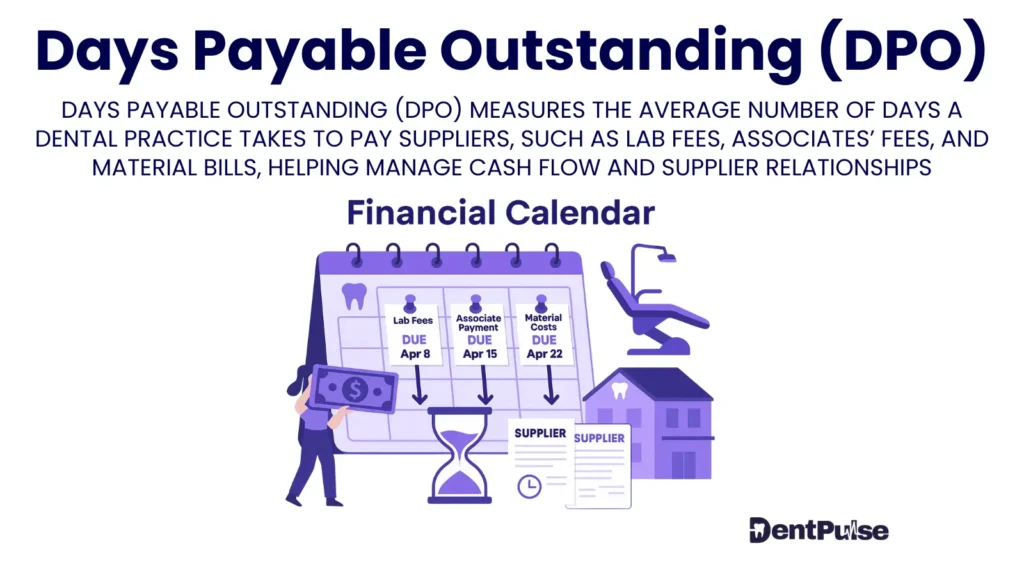What Is Days Payable Outstanding (DPO) in Dental Practices?
Days Payable Outstanding (DPO) is a financial metric that measures the average number of days your dental practice takes to pay suppliers after receiving a bill.
It reflects how long you hold on to cash before settling payables like labs, materials, rent, marketing, or service providers — and directly influences your working capital and liquidity.
Why DPO Matters for Dental Practice Owners
DPO is a cash timing strategy — not just an accounting stat.
Stretching supplier payment terms (without harming relationships) can:
- Improve short-term liquidity
- Smooth out cash flow gaps
- Fund operations without borrowing
Example:
If your practice pays lab bills in 30 days instead of 14, you free up 16 extra days of cash each cycle.
On £12,000/month lab spend, this creates a rolling £6,400 liquidity buffer.
But delay too much, and you risk late fees, strained relationships, or damaged reputation.
How Is DPO Calculated?
| Formula | Explanation |
| DPO = (Accounts Payable ÷ Cost of Goods Sold) × Number of Days | Measures how many days (on average) it takes to pay suppliers |
In dentistry, COGS = labs + materials + direct costs
Recommended period = 30 or 90 days for rolling analysis
How DentPulse Tracks DPO Automatically
| Feature | Function |
| AP Timing Tracker | Records when supplier invoices arrive vs. when they’re paid |
| Supplier Terms Engine | Benchmarks actual vs. agreed payment terms |
| Working Capital Overlay | Shows DPO alongside debtor days (DIO, DSO) for full liquidity picture |
| Pressure Forecast Link | Highlights if accelerated payments are draining reserves |
| Red–Amber–Green Zones | Flags DPOs that are too low (overpaying) or too high (at-risk) |
DentPulse helps you optimise payment timing — not just report it.
DentPulse Tip™
Paying early isn’t a virtue if it weakens your buffer.
Paying late isn’t strategic if it risks penalties.The sweet spot is consistent timing that protects cash and relationships — tracked in real-time inside DentPulse.
Related Glossary Terms
- Accounts Payable (AP) – Total unpaid bills and supplier obligations
- Working Capital – Cash available after current liabilities
- Burn Rate – Speed at which cash is consumed by operations
- CFFP™ – Cash Flow Future Pairing – Matches outflows to expected inflows
- Supplier Terms – Agreed payment timelines for labs, materials, services
Glossary Summary Table
| Term | Meaning |
| Days Payable Outstanding (DPO) | Average time taken to pay suppliers after invoice receipt |
| Formula | (Accounts Payable ÷ Direct Costs) × Days in Period |
| Financial Role | Affects working capital, buffer strength, and supplier relations |
| DentPulse Advantage | Tracks live DPO, benchmarks timing health, and protects liquidity through smart alerts |




